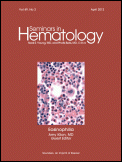
SEMINARS IN HEMATOLOGY
Scope & Guideline
Shaping the Future of Blood Health Through Scholarly Discourse.
Introduction
Aims and Scopes
- Hematologic Malignancies:
The journal covers a broad spectrum of hematologic malignancies, including but not limited to Hodgkin lymphoma, chronic lymphocytic leukemia (CLL), diffuse large B-cell lymphoma (DLBCL), and T-cell lymphomas, providing insights into their biology, treatment strategies, and patient management. - Innovative Therapies and Clinical Trials:
A significant focus is on novel therapeutic approaches, including immunotherapy, CAR T-cell therapy, and other targeted treatments, highlighting their clinical applications and outcomes from recent trials. - Molecular and Cellular Biology:
Research on the molecular mechanisms underlying hematologic diseases, including the role of biomarkers, epigenetics, and tumor microenvironment interactions, is a key area of interest. - Global Hematology Perspectives:
The journal also addresses global health issues in hematology, discussing disparities in treatment access, management strategies in low- and middle-income countries, and initiatives for improving care worldwide. - Translational Research:
There is a commitment to bridging laboratory research with clinical application, emphasizing how discoveries in basic science can lead to advancements in treatment and patient care.
Trending and Emerging
- Personalized and Precision Medicine:
There is a growing emphasis on personalized medicine approaches in hematology, including the use of genetic and molecular profiling to tailor treatment strategies for individual patients, particularly in CLL and DLBCL. - Immunotherapy and CAR T-Cell Therapy:
The exploration of immunotherapeutic strategies, especially CAR T-cell therapies, has surged, focusing on their efficacy, safety, and mechanisms of resistance, reflecting a paradigm shift in treating hematologic malignancies. - Tumor Microenvironment and Immune Interactions:
Research into the role of the tumor microenvironment and its interactions with immune cells is increasingly highlighted, emphasizing its importance in disease progression and treatment response. - Clonal Hematopoiesis and Its Implications:
Emerging studies on clonal hematopoiesis are gaining traction, exploring its implications in cancer, aging, and autoimmune conditions, indicating a broader understanding of hematological health. - Global Health and Hematology Equity:
The journal is increasingly addressing global health challenges in hematology, focusing on inequalities in treatment access and management strategies in diverse healthcare settings, particularly in low-resource environments.
Declining or Waning
- Traditional Chemotherapy Approaches:
With the rise of novel therapies such as immunotherapy and personalized medicine, traditional chemotherapy protocols for various hematologic malignancies are being discussed less frequently, indicating a shift in treatment paradigms. - Epidemiology of Rare Hematologic Disorders:
Although still relevant, discussions surrounding the epidemiology of less common hematologic disorders have become less frequent, possibly overshadowed by the more pressing issues related to common malignancies and innovative treatments. - Basic Hematology Education:
There appears to be a waning emphasis on fundamental hematology education and basic science topics, as the journal increasingly focuses on advanced research and clinical applications. - Pathophysiology of Non-Malignant Conditions:
While important, research focused solely on the pathophysiology of non-malignant hematologic conditions has seen a decrease in coverage, as the journal prioritizes malignancies and their treatments.
Similar Journals

Journal of Hematology & Oncology
Fostering Excellence in Hematology and Oncology ScholarshipJournal of Hematology & Oncology, published by BMC, is a leading open-access journal dedicated to the dynamic fields of hematology and oncology, with a continuous publication record since 2008. Based in the United Kingdom, this prestigious journal provides a platform for groundbreaking research, encompassing topics that span cancer research, hematological disorders, and molecular biology. With a remarkable Q1 ranking in multiple categories including Cancer Research, Hematology, Molecular Biology, and Oncology for 2023, it stands as a significant contributor to the scientific community. The journal's rigorous peer-review process ensures the dissemination of high-quality studies that drive advancements in these critical areas of medicine, boasting an impressive Scopus rank in the top echelons of its fields. As an open-access publication, it promotes widespread accessibility and sharing of knowledge, making it an indispensable resource for researchers, clinicians, and students striving to make advancements in understanding and treating hematological and oncological diseases.

HemaSphere
Championing open access to vital hematology research.HemaSphere, published by WILEY, stands at the forefront of hematology research, offering a vital platform for the dissemination of cutting-edge findings in the field. Since its inception in 2017 and official transition to Open Access in 2018, the journal has positioned itself as a leading conduit for high-impact research, maintaining a prestigious Q1 quartile ranking in the Hematology category as of 2023. Addressed in the United States at 111 River St, Hoboken, NJ, HemaSphere aims to foster a global dialogue among researchers, clinicians, and students by providing unrestricted access to high-quality content that encompasses clinical and experimental advancements. With an array of engaging articles, reviews, and commentaries, HemaSphere contributes significantly to the advancement of hematology, ensuring that critical knowledge is readily accessible to enhance patient care and innovative research. To explore the latest developments and breakthroughs in this dynamic field, we invite scholars, professionals, and students to engage with HemaSphere and elevate their understanding of hematologic science.
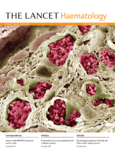
Lancet Haematology
Connecting researchers and clinicians for better patient outcomes.Lancet Haematology, published by Elsevier Science Ltd in the United Kingdom, is a premier peer-reviewed journal dedicated to advancing the field of hematology. With an impressive impact factor and listed in the Q1 category in hematology for 2023, this journal ranks #4 out of 137 in the Scopus database, boasting a 97th percentile indicating its influential role in disseminating high-quality research. Since its establishment in 2014, Lancet Haematology has provided a vital platform for researchers and clinicians to share groundbreaking studies, innovative treatment approaches, and novel therapeutic discoveries relevant to various hematological disorders. The journal does not operate under an open access model, but it offers multiple access options to facilitate engagement with its content. By bridging clinical practice and cutting-edge research, Lancet Haematology aims to foster the advancement of knowledge and improve patient outcomes in hematology, making it an essential read for professionals, researchers, and students alike.
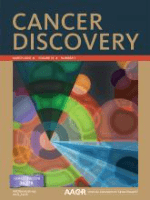
Cancer Discovery
Empowering Research to Transform Cancer OutcomesCancer Discovery, published by the American Association for Cancer Research, stands as a vital resource in the oncological research community, renowned for its commitment to disseminating groundbreaking studies and innovative findings in cancer biology, prevention, diagnostics, and treatment. With a significant impact factor reflecting its esteemed position, this journal facilitates open discussions and collaborations, striving to bridge the gap between experimental and clinical research. The journal, which has been active since 2011, is classified as a Q1 publication in 2023, underscoring its influence and authority in the realm of Oncology. By providing a platform for rigorous peer-reviewed articles, Cancer Discovery aims to advance our understanding of cancer and enhance therapeutic strategies, making it an indispensable tool for researchers, professionals, and students eager to stay at the forefront of cancer research.
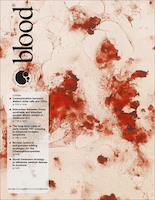
BLOOD
Advancing the Science of Hematology.BLOOD, published by the American Society of Hematology, is a premier peer-reviewed journal in the fields of Biochemistry, Cell Biology, Hematology, and Immunology. With an impressive impact factor and ranking in the top quartiles (Q1) across multiple disciplines, BLOOD is essential reading for researchers and professionals seeking to stay updated on the latest advancements in hematology and related fields. The journal has been a cornerstone of hematological research since its inception in 1946, providing a platform for rigorous scientific inquiry and discourse. Its commitment to publishing high-quality original research, comprehensive reviews, and insightful editorials makes it a vital resource for students, practitioners, and scientists alike. By offering exceptional access to influential publications, BLOOD continues to shape the future of hematology and enhance understanding of blood-related disorders, marking its vital role in advancing both basic and clinical research.
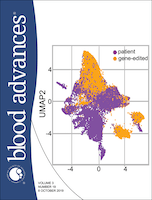
Blood Advances
Empowering Researchers in Blood AdvancesBlood Advances is a premier, peer-reviewed journal published by Elsevier, dedicated to the field of hematology. With an impressive impact factor and classified within the Q1 category of hematology for 2023, it ranks as the 16th out of 137 journals in the Scopus Medicine Hematology category, placing it in the top 88th percentile globally. This influential journal, which has been disseminating invaluable research since its inception in 2017, focuses on advancing knowledge and innovation in blood science, including clinical and laboratory aspects of hematology. Although it offers limited open access features, its comprehensive scope encompasses various topics relevant to both researchers and practitioners. Located in the United States and managed from Amsterdam, Blood Advances provides a vital platform for the dissemination of groundbreaking research, making significant contributions to the understanding and treatment of blood disorders. Researchers, professionals, and students alike will find this journal an essential resource for keeping abreast of the latest developments and advancements in hematology.
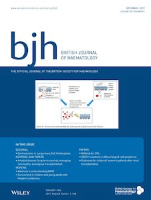
BRITISH JOURNAL OF HAEMATOLOGY
Elevating Hematology Knowledge for Better Patient CareBritish Journal of Haematology, published by Wiley, is a leading journal in the field of hematology, with an impressive impact factor reflecting its significance in the medical research community. Established in 1955, the journal has consistently contributed to advancing knowledge in hematology, currently holding a prestigious Q1 ranking in the Scopus category of Hematology, placing it in the top 18% of the field. The journal encompasses a broad range of topics including clinical and laboratory aspects of blood disorders and hematological malignancies, making it an essential resource for hematologists, researchers, and healthcare professionals. With its commitment to publishing top-tier research and clinical studies, the British Journal of Haematology plays a critical role in shaping treatment approaches and improving patient outcomes worldwide. Please note that this journal does not offer Open Access options, ensuring that published content is rigorously curated for quality and relevance.

Hemato is a pioneering open-access journal dedicated to the field of hematology, published by the esteemed MDPI from its base in Basel, Switzerland. Launched in 2020, this journal aims to provide a platform for researchers, clinicians, and professionals to share significant findings and advancements in blood-related disciplines over a converged timeframe until 2024. With a commitment to disseminating high-quality research, Hemato seeks to foster collaboration and innovation in hematological studies, showcasing original articles, reviews, and clinical studies that contribute to expanding knowledge in this vital area. As an open-access journal, it promotes accessible scholarship, ensuring that groundbreaking research reaches a broad audience, thereby enhancing the impact on the global health community.

Hematologie
Pioneering Discoveries in HematologyHematologie is a highly regarded journal in the field of hematology, published by JOHN LIBBEY EUROTEXT LTD. With an ISSN of 1264-7527 and an E-ISSN of 1950-6368, this journal has established itself as a vital resource for researchers, clinicians, and students dedicated to advancing the understanding of blood disorders and treatments. Although the journal's coverage in Scopus was discontinued in 2018, it has continually provided invaluable insights and research findings. The journal aims to foster knowledge sharing and discussion in hematology, exploring innovative methodologies and emerging trends in the field. With a commitment to quality research, Hematologie remains an essential platform for disseminating critical findings that can drive clinical practice and influence future studies in hematological sciences.
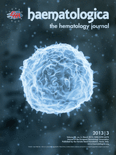
HAEMATOLOGICA
Leading the Way in Hematological InnovationHAEMATOLOGICA, published by FERRATA STORTI FOUNDATION, is a prestigious journal in the field of hematology, recognized for its high impact and contribution to advancing research in this critical area of medicine. With an impressive Q1 ranking in the 2023 category of Hematology and a notable Scopus rank of #12 out of 137, the journal serves as an essential platform for disseminating innovative studies, clinical trials, and comprehensive reviews from 1947 to 2024. Based in Italy, with a commitment to quality and academic integrity, HAEMATOLOGICA fosters collaboration among researchers, practitioners, and students interested in the latest developments and methodologies within hematological science. Although it does not offer open access, the journal ensures that valuable insights are accessible through institutional subscriptions, emphasizing its role in shaping the future of hematologic research.